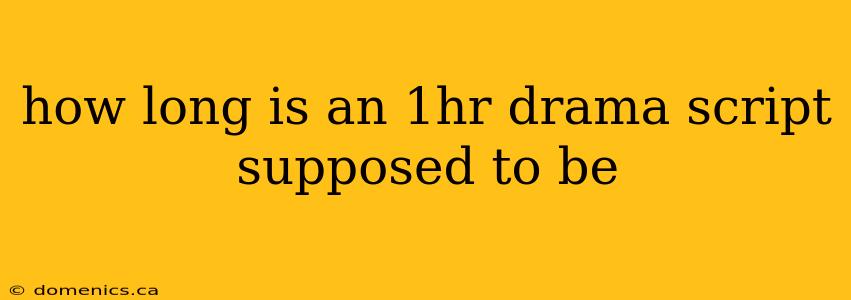A common question for aspiring screenwriters is: how long should a script for a one-hour drama be? The answer isn't a single number, but rather a range dictated by several factors. Understanding these factors is crucial to crafting a compelling and marketable script.
Page Count vs. Runtime
The most common measurement for script length is pages. A standard page of a screenplay is typically 1-inch margins, 12-point Courier font, and double-spaced. However, even with these standards, a precise page count-to-runtime conversion isn't perfectly consistent. Different scenes move at different paces.
Generally, a one-hour drama script should fall between 50 and 60 pages. This range accounts for variations in scene pacing and commercial breaks (in broadcast television). A 50-page script might be tightly paced with minimal dialogue or scene changes. A 60-page script might include more expansive scenes and subplots.
Factors Affecting Script Length
Several elements influence the final page count of your hour-long drama:
Genre Conventions:
- Action-heavy dramas: These often clock in at the lower end of the page range due to the faster pace and visual storytelling. Action sequences often take up less page space than lengthy dialogue scenes.
- Dialogue-driven dramas: These tend to be longer, with more emphasis on character interactions and exposition. Extended conversations can quickly add up in page count.
- Mystery/Thriller: These often occupy the middle of the page range, balancing action and dialogue to sustain suspense.
Scene Complexity:
- Complex scenes with multiple characters and locations: These inherently take up more space than simpler scenes with fewer characters and locations.
- Scenes with extensive descriptions: Detailed descriptions of settings, costumes, and actions can impact page length. Keep descriptions concise and focused on what's essential to the scene's visual impact.
Network/Platform Requirements:
Different networks and streaming platforms may have slightly different requirements or preferences for script length. Research the specific guidelines of your target outlet. Some platforms might prefer shorter episodes to maintain viewer engagement.
Commercial Breaks (Broadcast Television):
For broadcast television, the script's page length needs to account for commercial interruptions. This adds an extra layer of complexity to the runtime calculation. The actual runtime of the show needs to fit into the allotted time, including commercials.
Tips for Managing Script Length
Here are a few strategies for keeping your script within the appropriate length:
- Focus on efficiency: Eliminate unnecessary dialogue and descriptions. Every scene should advance the plot or develop character.
- Cut extraneous subplots: Focus on the core narrative.
- Tighten dialogue: Avoid overly verbose characters. Aim for concise and impactful dialogue.
- Use action lines effectively: Show, don't tell. Convey information visually, using action lines whenever possible.
- Review pacing: Ensure a consistent and engaging pace throughout the script. Avoid slow or overly rushed sections.
Conclusion: Finding the Right Balance
The ideal length for a one-hour drama script is a balance between telling a complete and compelling story and adhering to industry standards. While the 50-60 page range serves as a helpful guideline, ultimately, the most important thing is to create a script that is engaging, well-paced, and fulfills the needs of your specific story. Remember to review your work and be prepared to revise and refine until you achieve the optimal balance between page count and narrative effectiveness. A well-crafted script is more crucial than adhering rigidly to page count.
